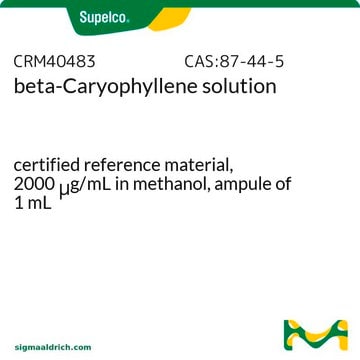74856
(−)-Linalool
analytical standard
Sinónimos:
(R)-(−)-Linalool, (R)-(−)-3,7-Dimethyl-1,6-octadien-3-ol
About This Item
Productos recomendados
grade
analytical standard
Quality Level
assay
≥97.0% (sum of enantiomers, GC)
optical activity
[α]20/D −20±2°, neat
shelf life
limited shelf life, expiry date on the label
technique(s)
HPLC: suitable
gas chromatography (GC): suitable
refractive index
n20/D 1.4615 (lit.)
n20/D 1.462
bp
198 °C (lit.)
density
0.862 g/mL at 20 °C (lit.)
application(s)
cleaning products
cosmetics
flavors and fragrances
food and beverages
personal care
format
neat
SMILES string
C\C(C)=C\CC[C@@](C)(O)C=C
InChI
1S/C10H18O/c1-5-10(4,11)8-6-7-9(2)3/h5,7,11H,1,6,8H2,2-4H3/t10-/m0/s1
InChI key
CDOSHBSSFJOMGT-JTQLQIEISA-N
¿Está buscando productos similares? Visita Guía de comparación de productos
General description
Application
- Tea samples using headspace-solid phase microextraction, followed by enantioselective gas chromatography with flame ionization detection (HS-SPME-GC-FID).
- Food matrices using headspace-solid phase microextraction (HS-SPME) coupled to gas chromatography–combustion-isotope ratio mass spectrometry (GC–C-IRMS).
signalword
Warning
hcodes
Hazard Classifications
Eye Irrit. 2 - Skin Irrit. 2 - Skin Sens. 1 - STOT SE 3
target_organs
Respiratory system
Storage Class
10 - Combustible liquids
wgk_germany
WGK 3
flash_point_f
166.3 °F - closed cup
flash_point_c
74.6 °C - closed cup
ppe
Eyeshields, Gloves, type ABEK (EN14387) respirator filter
Elija entre una de las versiones más recientes:
¿Ya tiene este producto?
Encuentre la documentación para los productos que ha comprado recientemente en la Biblioteca de documentos.
Los clientes también vieron
Nuestro equipo de científicos tiene experiencia en todas las áreas de investigación: Ciencias de la vida, Ciencia de los materiales, Síntesis química, Cromatografía, Analítica y muchas otras.
Póngase en contacto con el Servicio técnico











